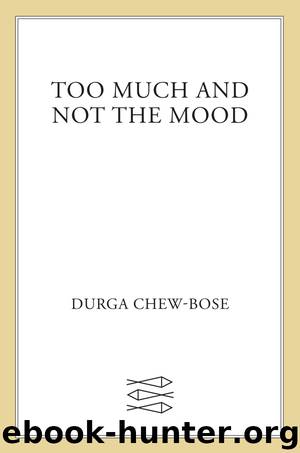Too Much and Not the Mood by Durga Chew-Bose

Author:Durga Chew-Bose
Language: eng
Format: epub
Publisher: Farrar, Straus and Giroux
3
Miserable
PRONOUNCED miz, as in Ms. magazine. Uh as in an expression of hesitation. And rull, as in rhymes with dull. In my family, when someone is miserable, we say miz-uh-rull. We say it like this because, as a kid, I couldn’t pronounce the word miserable. The B sound eluded me. I couldn’t push beyond that second syllable and form the last two: the ruh. The bull. It was as if I was encumbered by the word’s very meaning; too dejected to complete it. miz-uh-rull, it turns out, was my very own, self-styled onomatopoeia. Whatever inextricable despair I was experiencing at the age of three, it outdid me.
Some babies, once born, remain unready. Despite our smallness we are in possession of a lair of apprehension, chambered in order to lodge how estranged we feel when someone, say, tosses us a ball. Or expects from us pure jubilation the first time we encounter a Slinky. As a child, a Slinky stalled on a flight of steps caused me acute stress. The way it would cede to its coils—sometimes pause and appear to levitate—and then fail, abandoning all momentum. I couldn’t cope with the suspense. In photographs, my little hands are holding each other tight, or gripped around my wrists like clamps. Concern, far beyond my scope, was compacted into me.
There’s something about a distraught child that is instantly significant. She gets it: the world is often ten seconds away from tasting like cold french fries. The world can assert itself like a category-3 shitstorm of major letdowns, and minor ones too, which I’ve learned are harder to make peace with because they are somehow inexpressible. Averting one’s attention; reacting unreasonably with no tools to recuperate; seeking sanctuary in the company of friends, who are also unprotected from feeling wrecked; mending on an empty stomach; experiencing life as if you’re watching it from behind a shoulder-high wall—ducking when it’s too much, peering over to discover more, both wise to and oblivious of everything out of view, rashly tossing your effects over the ledge and starting over with nothing. The illusion of nothing, that is. There’s no suitable language for feeling adrift when on paper you seem all right. Arguing with yourself into becoming someone else is next to impossible. And then the world disappoints. And no amount of interpretative power could have prepared you.
Perhaps I’m still too young to have ideas occur to me. Perhaps I learn and then forget. I’ve Googled many times what poison ivy looks like and I still can’t identify it. Perhaps I’m still unready to conceive of a life entirely my own because I’m preoccupied with the quality of blue in pictures of my parents before I was born. At twenty-nine—that cusp, almost craning, turgid age—I so badly miss hearing, of all things, my father fill the dishwasher, precisely, just as he’s always done. Or how he still yells into the phone when he’s speaking long-distance, to an uncle in India. How expressions of deep love in Bengali somehow boom throughout the house like disagreements might in English.
Download
This site does not store any files on its server. We only index and link to content provided by other sites. Please contact the content providers to delete copyright contents if any and email us, we'll remove relevant links or contents immediately.
| Diaries & Journals | Essays |
| Letters | Speeches |
The Rules Do Not Apply by Ariel Levy(4104)
Bluets by Maggie Nelson(3913)
Too Much and Not the Mood by Durga Chew-Bose(3828)
Pre-Suasion: A Revolutionary Way to Influence and Persuade by Robert Cialdini(3607)
The Motorcycle Diaries by Ernesto Che Guevara(3507)
Walking by Henry David Thoreau(3365)
What If This Were Enough? by Heather Havrilesky(3012)
The Day I Stopped Drinking Milk by Sudha Murty(2928)
Schaum's Quick Guide to Writing Great Short Stories by Margaret Lucke(2901)
The Daily Stoic by Holiday Ryan & Hanselman Stephen(2829)
Why I Write by George Orwell(2458)
The Social Psychology of Inequality by Unknown(2434)
Letters From a Stoic by Seneca(2417)
A Short History of Nearly Everything by Bryson Bill(2260)
Feel Free by Zadie Smith(2180)
Insomniac City by Bill Hayes(2172)
A Burst of Light by Audre Lorde(2075)
Upstream by Mary Oliver(2034)
Miami by Joan Didion(1960)
